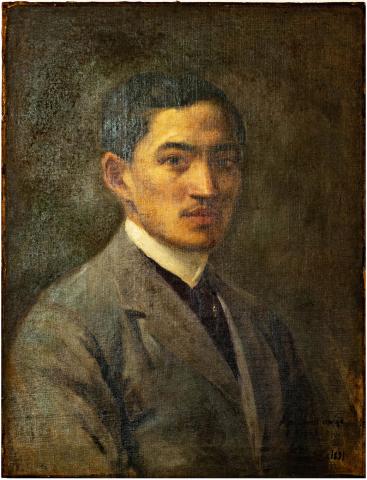
José Rizal (1861–1896)
The ophthalmologist and writer José Rizal was the leader of the Propaganda Movement in the Philippines, which began in the 1880s. Rizal and other Filipino intellectuals consulted seventeenth-century texts to gain a better understanding of pre-Spanish era Filipino religion and history. This pro-Filipino campaign aimed to make the Philippines a fully recognized, autonomous overseas province of Spain, contributing art, ideas, and leaders.
The movement mostly took place in Spain and only lasted through the early 1890s, but it was an important line of resistance against Spanish authorities’ depictions of Filipinos as “tribally fragmented,” incapable of self-government, and racially inferior.
In 1887, Rizal published Noli me tangere (Touch me not), criticizing Spanish rule and corrupt religious officials. Nine years later, he was executed by the Spanish for rebellion, sedition and conspiracy. Juan Luna made this portrait as a tribute to his friend and in admiration of his courage.
Audio Transcription: José Rizal is a national hero of the Philippines. So in a sense, you can have Rizal from womb to tomb, meaning you can be born in a Rizal hospital and when you die, they can put you up in a Rizal funeral home. His monuments are everywhere. Rizal, in the 25 volumes of (his) writing, not just the two novels that he's famous for, defined what it was to become a Filipino and defined what it was to be a nation. It has poetry, it has drawings, it has laundry receipts and lottery tickets. And I'd like to think that José Rizal, like many of his generation who went abroad to study, they learned to love their country more when they were out of it. You miss home, you miss the food, you miss your own language. He worked in the British Library in 1889, was reading 17th century texts about the Philippines, and he realized that the Philippines had a civilization before the Spanish period. Spain is supposed to have brought Christianisation, saved us from damnation, and brought us the alphabet, the wheel, but Rizal discovered that the coming of Spain was actually an intrusion. For the first time, instead of thinking of himself as part of an overseas Spanish empire he saw himself as a son of the Philippines. He was from this island nation and it is rather unfortunate that Rizal did not live to see the nation that he imagined. But his importance lies in the fact that he imagined a nation even before it was born.
– I'm Ambeth Ocampo, professor of history at Ateneo de Manila University. My area of specialization is the late 19th century Philippines